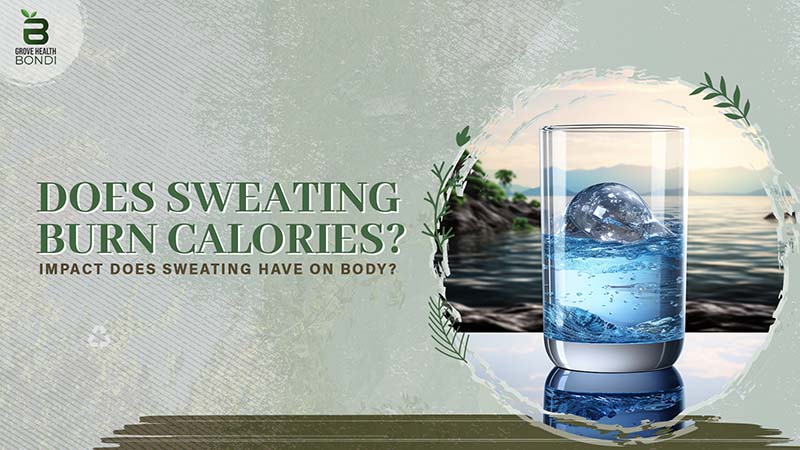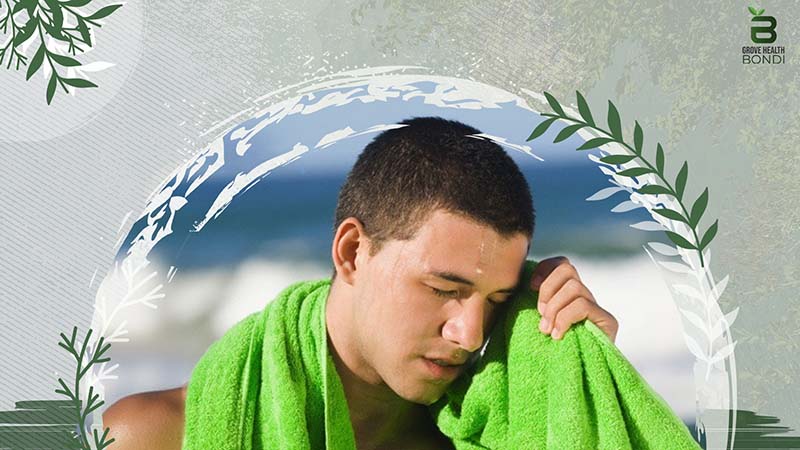The body typically regulates its temperature by sweating. After exercise, the body releases a significant amount of sweat. However, does sweating burn calories?
Intense exercise causes the body to sweat more, which also requires more energy consumption than usual. So, does sweating burn calories? In reality, sweating more does not mean the body burns more calories. Physical activity is the effective way to burn calories. For more details on this topic, follow the article below by Grove Health Bondi!

1. The Effects of Sweating
The body regulates its temperature through sweating. This phenomenon occurs when the body releases salt and water through the skin by evaporation to help cool you down. So, does sweating burn calories? Sweating does not burn a significant number of calories, but it does cause the body to lose water weight. However, this is only a temporary cooling process; once you rehydrate or eat, your body will return to its original weight.
Sweating can bring several benefits to the body, such as:
- Removing impurities from the body: Sweat helps eliminate waste products from metabolism or toxins that accumulate on the skin.
- Cooling the body: Sweat helps the body automatically regulate the rising temperature when you exercise intensely.
- Improving skin health: High-intensity exercise promotes blood circulation, bringing oxygen and nutrients to nourish skin cells.
- Indicating suitable exercise intensity: Excessive sweating accompanied by fatigue, dizziness, or nausea means you are overexerting yourself.

2. Adverse Effects of Excessive Sweating
When the body sweats, it reduces the fluid levels in the body. Excessive fluid loss can lead to dehydration.
Dehydration occurs when the body does not get enough fluids to replace what is lost. This can be dangerous to the body’s functioning. Symptoms of dehydration include dry mouth, thirst, headache, dizziness, dark yellow urine, and reduced urine output.
Excessive sweating and dehydration can be life-threatening. If you experience symptoms like confusion, fainting, decreased urine output, rapid breathing, increased heart rate, dizziness when standing, irregular pulse, or seizures, seek medical attention immediately.
Additionally, if you experience excessive sweating and weight loss not due to exercise or a healthy diet, you should consult a doctor. This could be caused by thyroid issues or infections such as chest pain, fever, prolonged sweating, rapid heartbeat, night sweats, or unexplained sweating.

3. Does Sweating Burn Calories?
Many people wonder: The more active you are, the more you sweat, so does sweating burn calories? In reality, sweating can slightly affect the number of calories you burn, but the impact is minimal. Sweat glands use the body’s glucose for energy, thus consuming a small amount of calories.
Metabolism involves all processes of energy use or energy conversion in the body. Metabolism is directly related to the intensity of the exercise you are performing, making calorie burning more significant.
In summary, sweating does not burn a significant amount of calories. Physical activity that boosts metabolism and energy use is what burns calories and reduces excess fat.

4. Why Do People Sweat Differently?
During the same physical activity or rest period, you might notice that some people sweat more or less than others. Several factors contribute to this, including the activity of sweat glands and the body’s adaptation to temperature.
Some reasons for varying sweat levels include:
- Number of active sweat glands: An individual can have 2 to 4 million sweat glands, which become fully active at puberty. Additionally, men’s sweat glands typically function more vigorously than women’s.
- Genetic factors: If parents sweat a lot, their children might also experience this.
- Environmental factors: Weather and temperature can affect the body’s sweating.
- Age and weight: These factors can influence the activity of sweat glands.
- Body temperature and cooling speed vary among individuals, leading to different sweating levels.
Among these factors, weight and physical fitness significantly impact the amount of sweat produced during exercise. Higher body weight means more energy expenditure, causing more sweating to cool down the larger body mass.

5. How to Burn Calories Effectively
Calories burned through physical activity or exercise are greater than those burned by lifting weights. However, any form of physical activity will burn more calories with increased intensity. Here are some effective ways to burn calories:
- Practicing yoga or water exercises, such as swimming.
- Doing household chores like mopping or using a push lawnmower.
- Running or hiking.
- Engaging in physical activities like darts, volleyball, or bowling.
- Listening to music while exercising: This helps you relax, extend workout time, and potentially burn more calories.
- Standing more (if possible) or balancing on one foot, reducing unnecessary sitting.
- Taking the stairs.
- Going to the gym.
If you aim to lose weight by burning calories, the best way to achieve a healthy weight is to adopt an active lifestyle. Maintain a healthy, balanced diet and exercise regularly. Sweating does not burn significant calories, but physical activity will consume energy, burn calories, and consequently reduce body weight.
Sweating is a natural cooling process during physical activity. Calories are not significantly lost through sweating. Instead, the metabolism and energy use during activity burn more calories. This article has addressed the question, does sweating burn calories? Stay healthy and follow our upcoming articles for more insights.

